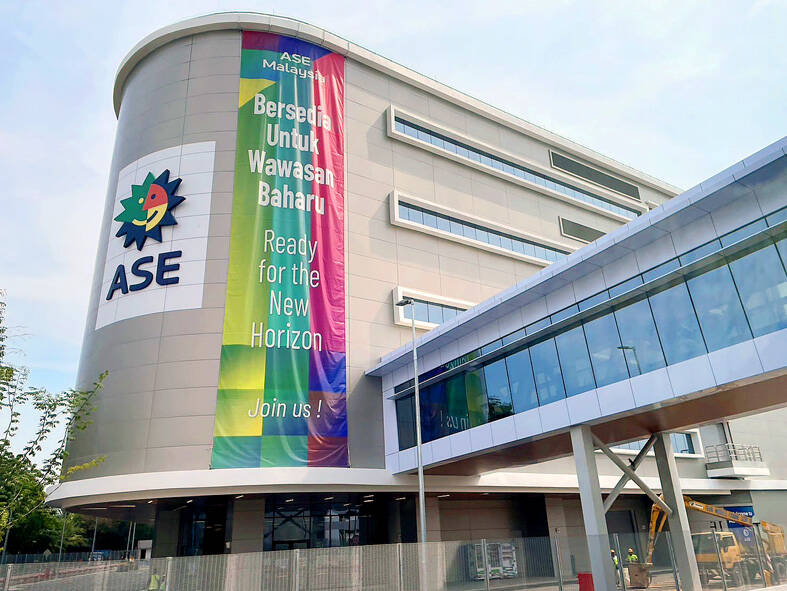ASE Technology Holding Inc (日月光投控) yesterday said revenue from its core chip assembly and testing manufacturing (ATM) business would grow up to 11 percent sequentially this quarter as customers step up inventory buildup to address potential tariff risks.
However, the company expects a 10 percent annual reduction in revenue for its electronic manufacturing service business this quarter on seasonal factors, ASE said.
Overall revenue this quarter is expected to increase at least 2 percent from NT$148.15 billion (US$4.63 billion) last quarter, it said.

Photo: CNA
“Heading into the second quarter, product flow appears to be strong ... and we are seeing some potential for accelerated seasonality and inventory build during the quarter,” ASE said.
Gross margin for the ATM business is expected to expand to between 24 percent and 24.1 percent, compared with 22.6 percent last quarter, the company said.
Regarding the company’s US expansion plans, ASE chief financial officer Joseph Tung (董宏思) said the company “was invited by customers to evaluate the possibility of supporting their business in the United States.”
“We are engaging in discussions and are evaluating the opportunities with interest. We have no further details so far in terms of the actual investment size or the timeline, but any decision that we will eventually make will be made based on economic viability,” he said.
Asked about the reportedly softening demand for Taiwan Semiconductor Manufacturing Co’s (TSMC, 台積電) advanced chip-on-wafer-on-substrate packaging technology, Tung said the company did not see anything “out of the ordinary.”
TSMC is one of ASE’s customers.
“Right now, we are not seeing any major behavioral changes among our customers, and therefore, for this year, we’re not making any changes. I don’t think any structural changes are warranted at this point,” Tung said.
“We are still in a catch-up mode in terms of building our capacity to meet the demand and as our foundry partner has a long-term, five-year CAGR [compound annual growth rate] forecast of 45 percent,” Tung said.
ASE maintained its projected capital spending for this year at about US$2.5 billion.
The company would continue aggressively expanding its capital budget in the chip testing business, primarily for advanced technology and those for AI-related chips, Tung said.
This business is “a margin-accreted business for us,” he added.
Chip testing revenue is expected to contribute about 20 percent to the company’s total revenue by the end of this year, compared with about 16 percent last year, ASE said.
The company’s net profit last quarter grew 33 percent to NT$7.55 billion, from NT$5.66 billion a year earlier. That represented a quarter-on-quarter decline of 19 percent from NT$9.31 billion.
Earnings per share were NT$1.75 last quarter, up from NT$1.31 a year earlier, but down from NT$2.15 a quarter earlier.

IN THE AIR: While most companies said they were committed to North American operations, some added that production and costs would depend on the outcome of a US trade probe Leading local contract electronics makers Wistron Corp (緯創), Quanta Computer Inc (廣達), Inventec Corp (英業達) and Compal Electronics Inc (仁寶) are to maintain their North American expansion plans, despite Washington’s 20 percent tariff on Taiwanese goods. Wistron said it has long maintained a presence in the US, while distributing production across Taiwan, North America, Southeast Asia and Europe. The company is in talks with customers to align capacity with their site preferences, a company official told the Taipei Times by telephone on Friday. The company is still in talks with clients over who would bear the tariff costs, with the outcome pending further

WEAKER ACTIVITY: The sharpest deterioration was seen in the electronics and optical components sector, with the production index falling 13.2 points to 44.5 Taiwan’s manufacturing sector last month contracted for a second consecutive month, with the purchasing managers’ index (PMI) slipping to 48, reflecting ongoing caution over trade uncertainties, the Chung-Hua Institution for Economic Research (CIER, 中華經濟研究院) said yesterday. The decline reflects growing caution among companies amid uncertainty surrounding US tariffs, semiconductor duties and automotive import levies, and it is also likely linked to fading front-loading activity, CIER president Lien Hsien-ming (連賢明) said. “Some clients have started shifting orders to Southeast Asian countries where tariff regimes are already clear,” Lien told a news conference. Firms across the supply chain are also lowering stock levels to mitigate

NEGOTIATIONS: Semiconductors play an outsized role in Taiwan’s industrial and economic development and are a major driver of the Taiwan-US trade imbalance With US President Donald Trump threatening to impose tariffs on semiconductors, Taiwan is expected to face a significant challenge, as information and communications technology (ICT) products account for more than 70 percent of its exports to the US, Chung-Hua Institution for Economic Research (CIER, 中華經濟研究院) president Lien Hsien-ming (連賢明) said on Friday. Compared with other countries, semiconductors play a disproportionately large role in Taiwan’s industrial and economic development, Lien said. As the sixth-largest contributor to the US trade deficit, Taiwan recorded a US$73.9 billion trade surplus with the US last year — up from US$47.8 billion in 2023 — driven by strong

RESHAPING COMMERCE: Major industrialized economies accepted 15 percent duties on their products, while charges on items from Mexico, Canada and China are even bigger US President Donald Trump has unveiled a slew of new tariffs that boosted the average US rate on goods from across the world, forging ahead with his turbulent effort to reshape international commerce. The baseline rates for many trading partners remain unchanged at 10 percent from the duties Trump imposed in April, easing the worst fears of investors after the president had previously said they could double. Yet his move to raise tariffs on some Canadian goods to 35 percent threatens to inject fresh tensions into an already strained relationship, while nations such as Switzerland and New Zealand also saw increased